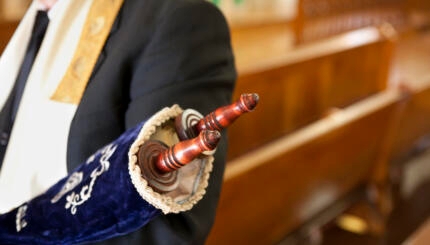Last week The New Republic ran a story saying that the Reconstructionist Rabbinical College, the seminary of the American Jewish Reconstructionist Movement, is considering admitting rabbinical students who are in interfaith relationships. Like most rabbinical seminaries in the United States, RRC does not currently allow students to be in interfaith relationships. In the headline of the story in The New Republic and repeatedly in the article, rabbis in interfaith relationships are referred to as “interfaith rabbis.”
I should say first that I don’t oppose intermarriage. I don’t believe that an interfaith partnership necessarily makes a Jew less Jewish. Many Jews who intermarry aren’t very connected to Judaism in the first place. For some, being in a life partnership with a non-Jew encourages them to explore their Judaism more fully, and they become more connected to their religion. Some Jews who become involved with non-Jews end up helping to make more Jews when their partners convert to Judaism. And because rabbis are not on a higher spiritual plane than our congregants, I see no reason that a committed Jew in a relationship or marriage with a non-Jew couldn’t be an effective rabbi.
All that said, being in an interfaith relationship does not make a rabbi an “interfaith rabbi.” To me, “interfaith rabbi” implies that the rabbi is not fully Jewish, and this is not the case. A rabbi is a rabbi. She is steeped in Jewish learning and tradition, that is what she teaches, that is what she brings to her work. Rabbis approach life through a Jewish lens and they are fully Jewish, regardless of who their partners are.
On the other hand, there might be a place for the term “interfaith rabbi.” Many of my congregants are intermarried, as is true in most Reform congregations, somewhat less so in Conservative congregations, and far less in the Orthodox world. However, nearly every rabbi sometimes interacts as a rabbi with non-Jews. I frequently minister to non-Jews, though always through a Jewish lens. Any rabbi who has non-Jewish congregants, or congregants with non-Jewish family members, will likely find himself in a position of working with them in some way. Any rabbi who has done chaplaincy in a hospital has visited and prayed with non-Jews. Rabbis who do these things could probably be called interfaith rabbis, though I still don’t care for the term.
If we were to call rabbis who sometimes work with or take care of non-Jews “interfaith rabbis,” it would still have nothing to do with who their life partners are. To Jews who have the spiritual calling to be rabbis, and who are willing to do the hard work it takes to become rabbis and then the harder work of serving the Jewish community as rabbis, it is an insult to imply that they are somehow not as Jewish because they are married or in a committed relationship with partners who are not Jewish.



